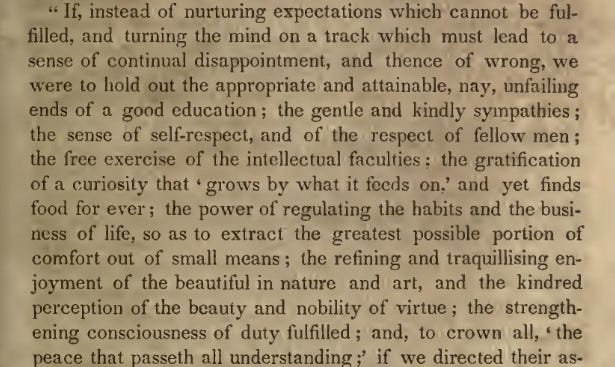continued from part II:
“This call to rights and morals doesn’t help us a finger’s breadth in terms of knowledge. [...] The anger that drives the poet is the right place to describe these abuses, and to confront the harmonizers who deny or sugar-coat those abuses in the service of the ruling class.”
„Dieser Appell an die Moral und das Recht hilft uns wissenschaftlich keinen Fingerbreit weiter. […] Der Zorn, der den Poeten macht, ist bei der Schilderung dieser Mißstände ganz am Platz, oder auch beim Angriff gegen die, diese Mißstände leugnenden oder beschönigenden Harmoniker im Dienst der herrschenden Klasse.“— Friedrich Engels
Surely the Florida Board of Education was in agreement with Kant:
“One sees this also among the savage nations. Even after serving the Europeans for a long time, they never get used to our way of life.”1
No point in teaching reasoning to the “savage nations:” Reason is not a practice, it’s a moral faculty, one lacking in savages and Blacks. Being “savage” is a moral deficiency.
Or being a proletarian. Jan Goldstein tells how the successors to Billaud-Varenne took up his mission and fashioned a new republican consciousness for the People — a people who, unlike the previous generation of Frenchmen, would not ask too many questions. The ruling Directoire subsidized the translation of Kant; In 1798 its leading ideologues invited Wilhelm von Humboldt to a “metaphysical symposium” where the German intellectual informed them that “all philosophy rests on the pure intuition of the moi, outside all experience.”2 Kant would not have gone that far, but the Republic One and Divided was to go even further, with Victor Cousin.
Victor Cousin: Peer on France, Director of the prestigious École Normale Supérieure, to this day the breeding jar for French intellectuals; member of the no less influential Institut de France; Minister for Public Education in 1840 and, most terrifying of all, Presiding Juror for the teaching diploma in Philosophy. Also an honorary member of the American Academy of Arts and Sciences.
Cousin, more than anyone else, shaped primary education as we know it today, even as far as America, where his Report on the state of public instruction was enthusiastically received, translated, abridged and reprinted, even with state government funding. Cousin, for all his democratic posturing, was a modern-day liberal insofar as he believed the Public Good should be in the hands of an enlightened caste, “a scientifically informed body that would expertly manage affairs for the good of society as a whole.” [Goldstein 290]. After Cousin the administration of education held a stranglehold on the meaning of Education itself. Even so, it’s not so much the administration itself that's concerning but its aims: not how or where education takes place, but its purpose:3
With Cousin and his followers education becomes a differentialist pedagogy, to retool a concept from Étienne Balibar.All classes, “races” or social groupings are exposed to the same educational practices whose Kantian justification is, that they are based on universal principles. As with Kant and his “savages,” each group is assigned a ranking commensurate to their imputed competency. The result? "The construction of a hierarchy of Others in relation to the Same, an “exasperating” substitute for absolute, universal respect for human rights."4 Students are encouraged to pursue the “higher things” in order to spare them from “resenting their condition,” while finding themselves defined as constitutionally, perhaps genetically, limited in their assigned quest to attain these higher things, except “in a certain measure.” If you’re Black stay back: this is why Du Bois insisted Black education in America must be grounded in the highest aspirations.
Not just Blacks, or even proletarians : also Jews. Balibar calls differentialist racism a generalized anti-Semitism [« un antisémitisme généralisé », p. 37]. The same can be said of differentialist pedagogy: that it’s generalized anti-Judaism, a metastasis of “Christian doctrinal hostility to Jews.” According to Richard Wagner Jews are incapable of imagination, and that is why they cannot compose music. They may speak the host language, practice the host culture, learn the host practices; their knowledge is never innate, therefore, all of their cultural productions are superficial. When all is said and done, Imagination, as conceived by Kant, Cousin and Wagner, is little more than Divine Election, resurrected for the purpose.5
This metastasized repression, by which the ancient structures of discrimination retain their functions while the identity of the targeted group seems to vanish altogether, is commonplace in Higher Education. Columbia University in the City of New York has never had a quota limiting the number of Jews, yet for a hundred years or more its informal policy has been to “track” students into courses, departments and even colleges within the University that are deemed more suitable. The end result is a benevolent form of social sabotage by which each student is railroaded into a system of shaming and humiliation, a permanent sense of powerlessness, of never being good enough for some unknown thing that’s supposedly the best. Norman Podhoretz, who made his way through that system in the post-war era, quotes the philosophy behind it with words that could have been lifted straight out of Victor Cousin.6 This atmosphere is particularly toxic in the Language departments, where a sizeable number of students are native speakers more competent than the teachers themselves, but it falls like a pall over all social interactions in the University and beyond. You feel it even blocks away, a toxic fog over the chartered streets.
WOID XXIII-10a3
Immanuel Kant, Über Pädagogik (Königsberg: Friedrich Nicolovius, 1803), p. 9.
Jan Ellen Goldstein, The Post-revolutionary Self. Politics and Psyche in France, 1750-1850. (Cambridge, MA: Harvard University Press, 2005), p. 127.
Victor Cousin, A brief description of the system of education adopted in the celebrated common schools of Prussia with some notice of school books corresponding in character to those used in the schools of that country (Philadelphia : Hogan and Thompson, 1838), pp. 23, 31; based on Victor Cousin, Rapport sur l'état de l'instruction publique dans quelques pays de l'Allemagne et particuliérement en Prusse (Paris: Imprimerie royale, 1832).
Jürgen Habermas, « La France et l'Allemagne doivent prendre l'initiative ». Le Monde, 9 septembre 2015; on differentialist racism see Étienne Balibar, « Préface », Balibar and Immanuel Wallerstein, Race, nation, classe. Les identités ambigües, 2e éd. (Paris : la Découverte, 1997), p. 33 sqq.
Steven Beller, Antisemitism. A Very Short Introduction (Oxford: Oxford University Press, 2007), p. 11; Richard Wagner, „Das Judenthum in der Musik”, Neue Zeitschrift für Musik (September 1850); expanded version (Leipzig: J. J. Weber, 1869).
Norman Podhoretz, Making It (New York : Random House, 1967), pp. 46-48.






